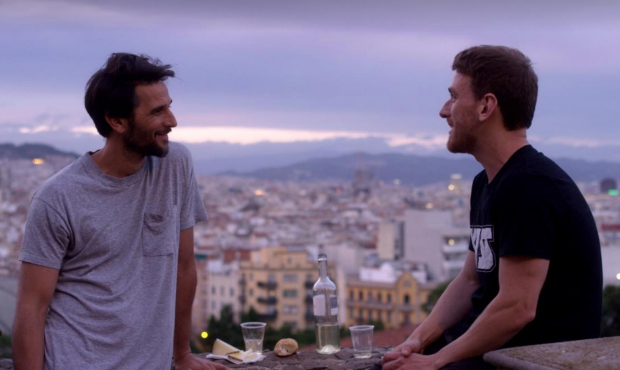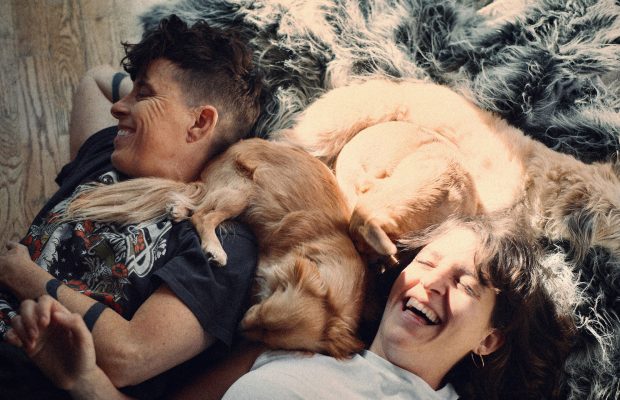‘End of the Century’ Review: Love Is Ephemeral in the Best Gay Film of the Year according to Jude Dry

Few films have captured the dual fleeting and enduring nature of intimate connection as poignantly as “End of the Century.” The film, an elegant three-hander that mostly revolves around two men who meet-cute on a Barcelona balcony, leaves a lingering impression on the heart. Like a great poem, “End of the Century” gives voice to a seemingly indescribable feeling, one anyone who’s ever fallen in love will recognize from deep in their soul — as if bumping into an old friend you forgot how much you liked. Written and directed by Argentinian filmmaker Lucio Castro in his feature debut, “End of the Century” is the natural descendant of lush romances like “Weekend” and “Call Me By Your Name,” and will certainly endure as one of the most evocative gay films of the decade.
Though no one speaks for the first 12 minutes of the film, the engaging opening relies solely on the capable and strong shoulders of Ocho (Juan Barberini), an Argentinian visiting Barcelona by way of New York. Giving the unmistakable impression of a visitor absorbing his surroundings with a traveler’s fresh eyes, he wanders through the simple-yet-lovely establishing city shots as he cycles through common activities of the solo traveler: Eating alone, observing locals, reading, swimming, showering, jerking off. From the balcony of his Airbnb, he spots a cute guy from the beach in a KISS shirt, and calls out the film’s first line: “Kiss!”
Like the rest of this delicate little film, this opening mating call feels both breezy and ripe with meaning, neither heavy-handed nor frivolous. When Javi (Ramón Pujol) enters the apartment, the two devour each other almost immediately in the first of many passionate sex scenes, all of which manage to balance hotness with tastefulness. Drinking wine on the roof after a day out, they discuss their professions, relationship statuses, and opinions on child-rearing. Ocho, a poet, has recently split from his partner of 20 years, and doesn’t want kids. Javi directs a kids’ TV show in Berlin, and has a daughter with his husband, with whom he is in an open relationship.
“I have a weird sensation. I feel that we’ve met before,” Ocho says, after ruminating on the fact that humans are always partially alone, even in relationships. To which Javi responds, “We have met before.” Before the line can sink in, the frame cuts quickly to Ocho arriving in a yellow-flecked train station, jumping feet first into in the film’s first twist of time.

Though intentionally vague at first, the film’s second act jumps to 20 years prior, with Ocho arriving to stay with Sonia (Mia Maestro), a classical singer he met through her ex-boyfriend. In her tertiary but pivotal role, Sonia describes the break-up to Ocho in wrenching detail, recalling the man who left her in Goa holding only the remnants of their intertwined belongings. The best-known actor of the three, after having broken out in 2004’s “The Motorcycle Diaries,” Maestro delivers this monologue with the perfect blend of deep emotion and performative nonchalance. Too young to realize the weight of her words, he listens intently.
Wandering the parks of Barcelona, Ocho follows a beefy man into the bushes only to bolt at the first sign of action. No matter, the man follows him and they share a hurried encounter, the guilt of which sends Ocho straight to the toilet, where he vomits for an entire day. Who should watch over him in his delirium but Sonia’s then-boyfriend, a young Javi. Once recovered, Ocho joins Javi at a museum, where the two young men muse over classical statues as if they were old relatives.
In describing a famous painting, Javi mentions “a magic connection, not a rational one,” and what follows is some of the film’s most resonant dialogue:
Ocho: “Now that you’ve told me that, I feel seeing it is not going to be the same … I don’t know if seeing it is necessary.”
Javi: “Then let’s not see it, I’ve seen it a thousand times.”
Later, after drinking boxed wine followed by tequila and cigarettes, they dance joyously in what has got to be the best use of Flock of Seagulls’ “Space Age Love Song” ever on film. Drunkenly pawing each other until they tumble onto the couch, they make love for the first time — again.
As all of these fleeting moments of intimacy reel the viewer in, the last act is a gutting and beautiful one-two punch that will leave audiences reeling. Castro metes out the lyrical surprises slowly and steadily, saving the best for last. His gentle touch guides the narrative, the camera, the characters, and the intimacy with the confident ease of a much more experienced filmmaker. He knows where to hold back and when to let loose; giving just enough to make you fall in love with the














